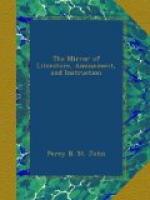“Yet still thy turrets drink the
light
Of summer evening’s
softest ray;
And ivy garlands, green and bright,
Still mantle thy decay;
And calm and beauteous, as of old,
Thy wand’ring river glides in gold.”
A.A. WATTS.
Among the most attractive scenes of northern Yorkshire is Studley Park, renowned for the richness of its sylvan scenery, which embosoms the noble ruin of Fountains Abbey.
For the date of my visit to this Arcadia, I must refer the reader to that season of life when the pure source of thought and feeling is untainted by the world. It is eleven miles from my home to Studley Park, five of which I walked in the twilight of a summer’s evening, and slept at a little cottage by the way. The day had been sultry, and the moon rose slowly over the mounds of Maiden Bower, once the site of the noble mansion of the Percys, now destroyed and desolate;[2] and fell in dreary softness on tower and wood, illumining the sable firs of Newby Park, and throwing another lustre on the gaudy “gowans” that decked the adjacent meadow. Here was a scene for the poetic sympathy of youth:
“That
time is past,
And all its giddy rapture;
Yet not for this faint I, nor mourn;
Other gifts have followed; for such loss
I would believe, abundant recompense.”
WORDSWORTH.
The morning found me, after an early breakfast, on the road to Studley Park. Now there are some “moods of my own mind” in which I detest all vehicles of conveyance, when on an excursive tour to admire the antique and picturesque.—Thus what numerous attractions are presented to us, sauntering along the woody lane on foot, which are lost or overlooked in the velocity of a drive! On the declivity of a meadow, inviting our reflection, rises a little Saxon church, grey with antiquity, and solemnized by its surrounding memorials of “Here lies.”—Across the heath, encircled with fences of uncouth stones, stands a stern record of feudal yore; at the next turn peeps the rectory, encircled with old firs, trained fruit trees, and affectionate ivy; beneath yon darkened thickets rolls the lazy Ure, expanding into laky broadness; and, beyond yon western woods, which embower the peaceful hamlet, are seen the “everlasting hills,” across which the enterprising Romans constructed their road. I next passed the boundaries of Newby Park, the property of Lord Grantham. Here beneath enormous beeches were clustering the timid deer, “in sunshine remote;” and the matin songs of birds were sounding from the countless clumps which skirt this retreat. Within that solitude had I enjoyed the society of a brother, alas, now no more! and yet the landscape wore the same sunny smile as when I carved his name on the towering obelisk before him. I felt that sorrow so exquisitely described by Burns:
“How can ye bloom so fresh and fair;
How can ye chant, ye little birds,
And I so weary, fu’ o’ care.”




